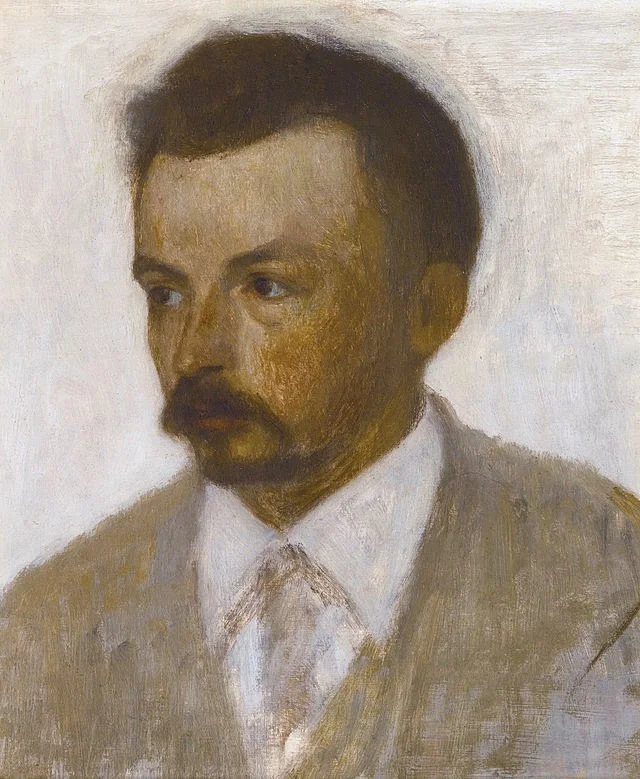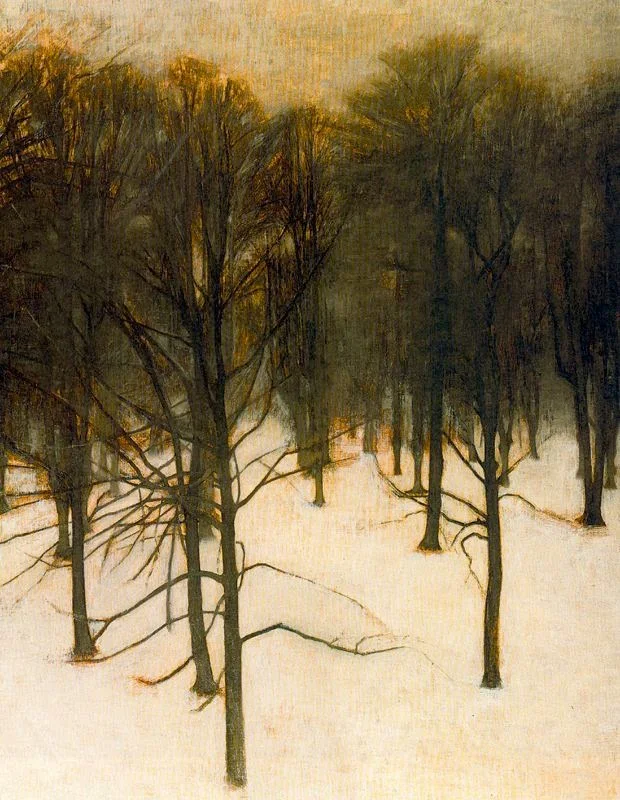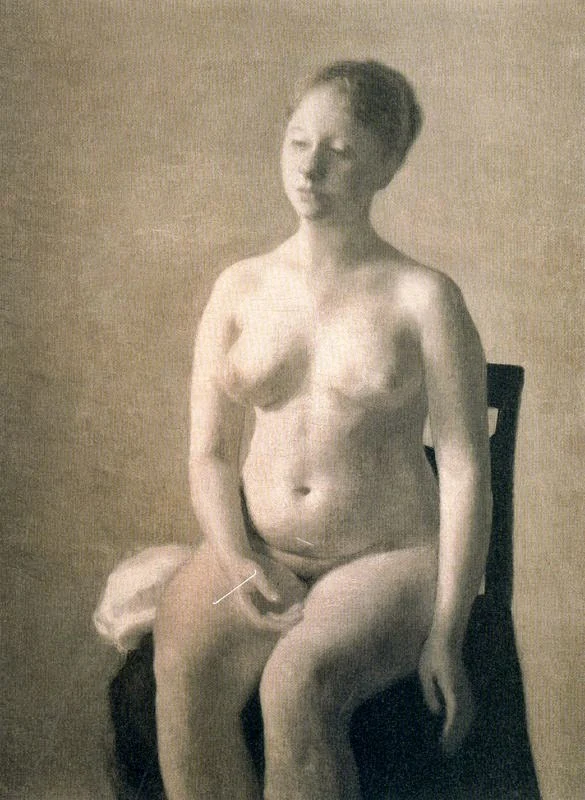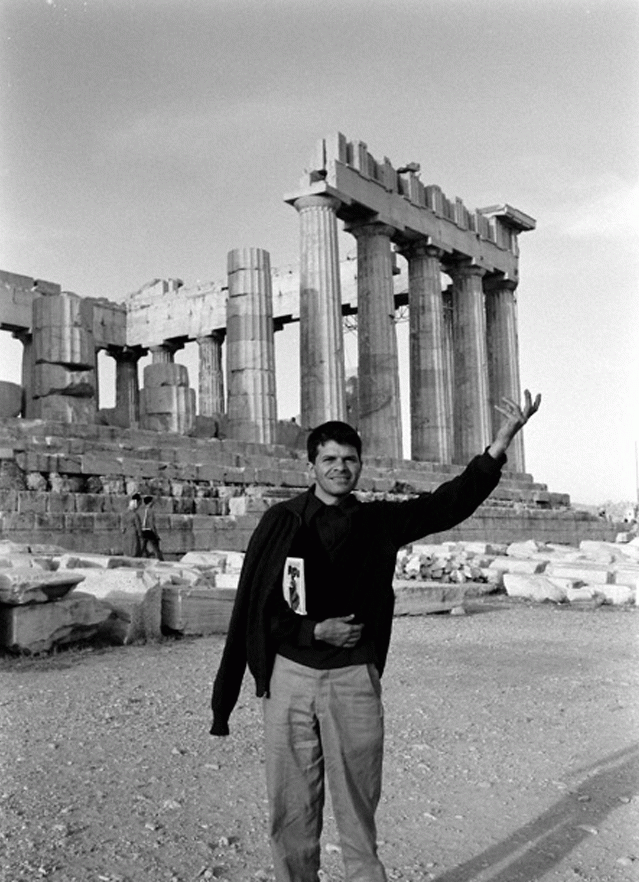Ψηλά παράθυρα. 1913. Μουσείο. Ordrupgaard, Charlottenlund. Δανία. Vilhelm Hammershøi,
The Tall Windows, 1913. Oil
on canvas, Ordrupgaard Museum, Charlottenlund, Denmark.
Ήρθε
η ώρα να μιλήσουμε για τον Δανό ζωγράφο Vilhelm Hammershoi (1864-1916) ή μάλλον
να αφήσουμε το έργο του να μας μιλήσει για τη σιωπή των κλειστών χώρων, του
εσωτερικού των δωματίων. Η ποίηση της σιωπής! Γιατί ποιητική είναι η ατμόσφαιρα
των εικόνων του Hammershoi.
Εσωτερικό δωματίου με φως του
ήλιου στο δάπεδο. 1900.
Aarhus Μουσείο Τέχνης. Κοπεγχάγη. Vilhelm Hammershøi, Sunbeams or Sunshine. Dust Motes Dancing in the Sunbeams, 1900
(oil on canvas, 70 x 59 cm).
Ο
Hammershoi γεννήθηκε στην Κοπεγχάγη όπου και έζησε όλη του ζωή. Ζωγράφισε ένα
μεγάλο αριθμό έργων που απεικονίζουν κυρίως το εσωτερικό σκοτεινών δωματίων του
σπιτιού, φωτισμένο αχνά από τις αχτίνες του ήλιου που διεισδύουν κρυφά από τα
παράθυρα.
Εσωτερικό δωματίου.
Strandgade 30. 1908.
Aarhus Mουσείο Τέχνης. Κοπεγχάγη.
Συχνά
τοποθετεί μέσα στο χώρο γυναικείες μορφές, που τις περισσότερες φορές τις
παρουσιάζει από πίσω, χωρίς να αποκαλύπτει το πρόσωπό τους ή αυτό που κάνουν.
Εσωτερικό δωματίου, 1899. Πινακοθήκη Tate. Λονδίνο. Vilhelm Hammershøi,
Interior, 1899. Oil on canvas, 64.5 x 58.1 cm.
Άλλες
φορές, πάλι, απεικονίζει γυναίκες να είναι απορροφημένες σε κάποια οικιακή
ασχολία. Αποτυπώνει τη γοητεία μιας στιγμής κρυφής ιδιωτικής ζωής που συγκινεί
με την απλότητα των χρωμάτων και των γραμμών, ενώ ταυτόχρονα συναρπάζει με το
μυστήριο.
Self-portrait, 1895.
Γεννήθηκε
και έζησε στην Κοπεγχάγη. Σπούδασε στη Βασιλική Ακαδημία των Καλών Τεχνών της
Δανίας. Τα πρώτα του έργα προκάλεσαν μάλλον αρνητικά σχόλια από τους
καλλιτεχνικούς κύκλους της Κοπεγχάγης λόγω των σκοτεινών χρωμάτων και των
συγκεχυμένων γραμμών που θύμιζαν περισσότερο σχέδιο παρά ζωγραφική. Στα έργα
του Ηammershoi διακρίνεται αισθητά η επιρροή του Αγγλοαμερικανού ζωγράφου
Whistler. Ωστόσο, δεν πρέπει να παραβλέψουμε και την επιρροή των Ολλανδών
ζωγράφων του 17ου αίωνα, όπως για παράδειγμα του Βερμέερ. Ο Hammersoi ταξίδεψε
στην Αγγλία και την Ολλανδία για να δει έργα τους.
Danish painter,
born in Copenhagen, where he lived throughout his life. The son of a merchant,
he was trained in drawing from the age of eight and studied at the Royal Danish
Academy of Fine Arts. As a young artist, he was influenced by Whistler. His
early work aroused some controversy, initially over its limited colour range
and somewhat sketchy handling. The rejection of Bedroom by the Academy jury in
1890 was the catalyst for the creation of a new Independent Exhibition the
following year. Hammershøi is best known for his paintings of interiors,
generally in a restricted greyish colour range. Where there is a figure,
usually female, it is either seen from behind, absorbed in some task, or
wrapped in contemplation of something beyond the space of the painting.
The artist drew
inspiration from the paintings of 17th-century Holland, especially a group of
works then attributed to Peter de Hooch but now believed to be by Peter
Janssens Elinga. Like the Dutch painter, he was preoccupied with near empty
spaces and the effects of light from a window. The setting was Hammershøi's own
apartment. He made particular play with open and closed doors to suggest a
space beyond what the spectator can see directly. It is the elusiveness and
sense of the mysterious which links Hammershøi to the international Symbolist
aesthetic. He also painted landscapes and the exteriors of buildings. These are
bereft of any human presence, even in his depiction of what was in reality the
busy thoroughfare running by Gentoffte Lake. The painter was as reserved in his
life as in his art. When he died he was internationally famous, but after his
death his work was largely forgotten until a revival of interest began in the
1980s. Text Source: A Dictionary of Modern and Contemporary Art (Oxford
University Press).
Photograph of Anna
Hammershøi, 1886. An official carte de visite portrait of the subject of
Hammershøi's painting, his nineteen-year-old sister Anna, taken by the Court
Photographer Budtz Müller. Credit: Dept. of maps, pictures and photographs,
Royal Library, Copenhagen.
Η προσωπογραφία ενός κοριτσιού, 1885. Συλλογή Hirschsprung. Κοπεγχάγη. Είναι η
Άννα, η αδελφή του ζωγράφου. Στα πρώτα έργα του χρησιμοποιούσε συχνά την αδελφή
του ως μοντέλο. Vilhelm Hammershøi, Portrait of a Young Girl, 1885 (oil on canvas). Hammershøi's
portrait of his sister Anna was painted when the artist was 21. The Danish
Royal Academy passed over the work when judging the 1885 Neuhausen Prize, and
the omission prompted a furious backlash from fellow artists who saw
considerable potential in the young painter's work.
Νεαρή γυναίκα από πίσω, 1904. Randers Συλλογή. Κοπεγχάγη. Vilhelm
Hammershøi, Interior with Young Woman
from Behind, 1904.
Φωτογραφία
από το σπίτι των γονιών του Hammershoi γύρω στα 1890. Photograph from the
home of Vilhelm Hammershøi’s parents, circa 1890. The living room of the
Hammershøi family home, as photographed by the painter V. Schønheyder Møller.
Hammershøi's portrait hangs on the wall, and Anna herself is seated at the
piano.
Εσωτερικό με γυναίκα στο
πιάνο. Οδός Strandgade 30. 1901.
Ιδιωτική Συλλογή. Vilhelm Hammershøi, Interior
with Woman at Piano, Strandgade 30, 1901 (oil on canvas, 55.9 x 45.1 cm).
Εσωτερικό δωματίου με φως
ήλιου. 1906.
Πινακοθήκη Tate. Interior, Sunlight on the Floor, 1906. Oil on
canvas, 51.8 x 44 cm.
Vilhelm Hammershøi
in the courtyard of Strandgade 30, winter 1907. Ida can be seen looking through
a window of the couple's apartment. Hammershøi painted the interior of this old
merchant house in Copenhagen more than 60 times, and many of the images on
which his reputation is founded were created here. In a rare interview
Hammershøi commented: "Personally I
am fond of the old; of old houses, of old furniture, of that quite special mood
that these things possess." Credit: The
Hirschsprung Collection.
To
1898 μετακόμισε σ᾽ένα παλιό εμπορικό σπίτι, χτισμένο από το
1636, στην οδό Strandgade 30. Πολλά από τα έργα του (πάνω από εξήντα)
απεικονίζουν εσωτερικούς χώρους αυτού του σπιτιού με μοντέλο τη γυναίκα του Ida
με την οποία παντρεύτηκε το 1891.
Vilhelm Hammershøi,
Ida Reading a Letter, before 1916.
Ο
περίφημος πίνακας του Η Ίντα διαβάζει ένα
γράμμα πουλήθηκε πανάκριβα σε δημοπρασία έργων τέχνης το 2012. Ο Hammershoi
απεικονίζει στο εσωτερικό ενός δωματίου τη γυναίκα του Ίντα (η Ίντα υπήρξε το
μοντέλο του για πολλά έργα του) να στέκεται πίσω από το τραπέζι διαβάζοντας με
προσήλωση ένα γράμμα. Βλέπουμε δύο λευκές πόρτες στο δωμάτιο… η μία είναι
κλειστή και η άλλη ανοιχτή. Λευκό τραπεζομάντηλο στο τραπέζι όπου διακρίνουμε
μια καφετιέρα, ένα φλιτζάνι και ένα πιάτο. Η αίσθηση της απόλυτης σιωπής
κυριαρχεί στο δωμάτιο…ένας υπέροχος πίνακας που αποτυπώνει την "ποίηση"
μιας ιδιωτικής στιγμής, της στιγμής της ανάγνωσης ενός γράμματος. Πρόκειται από
τα πρώτα του έργα που απεικονίζει το εσωτερικό
δωματίων της κατοικίας του στην οδό Strandgade 30. Τα δωμάτια αυτού του
σπιτιού με τη μορφή κυρίως της γυναίκας του
Ida έχουν αποτελέσει πολλές φορές θέμα των έργων του.
In 2005,
Hammershøi's life and oeuvre was featured in a BBC television documentary, Michael Palin and the Mystery of Hammershoi,
with the British comedian and writer Michael Palin. In the programme, Palin,
fascinated by Hammershøi, whose pictures he conceived as having a distinct enigmatic
coolness and distance about them, sets out to unlock the mysteries and find out
about the background of Hammershøi. Palin, wanting to know of his inspirations
and the reason for these mystical pictures, started his search in Hayward
Gallery in London, goes to Amsterdam and finally to Copenhagen.
Πηγή: annagelopoulou.blogspot.com, http://www.theguardian.com/.
Πηγή: annagelopoulou.blogspot.com, http://www.theguardian.com/.






































































